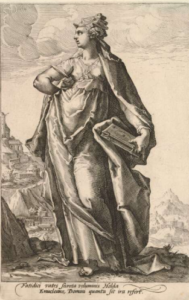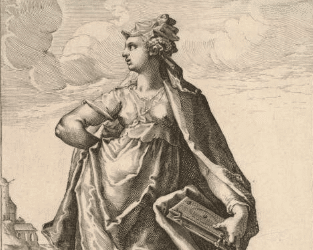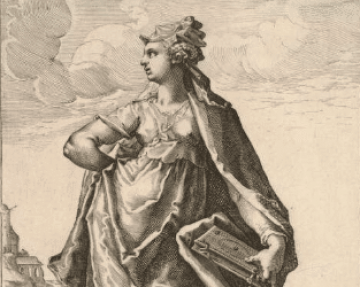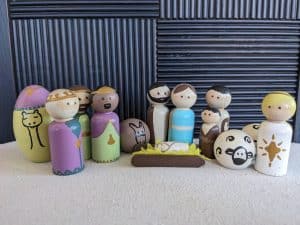…and so did she.
We’re going to talk about the prophet Huldah, who was a woman. But first, some background.
In 2 Kings 21, we read about the wicked reigns of Manasseh and Amon over the kingdom of Judah. Manasseh reined for 55 years. He spent that time establishing idolatry (2 Kings 21:2-9), desecrating the temple (2 Kings 21:4-5) and committing acts of violence (2 Kings 21:16). The people of Judah followed his lead:
…Manasseh seduced them to do more aevil than did the nations whom the Lord destroyed before the children of Israel.
2 Kings 21:9
When Manasseh died, his equally wicked son Amon took the throne, but governed for only two years before he was assassinated (2 Kings 21:18-23). That is how Amon’s son, Josiah, became king of Judah at the wee age of 8 years old (2 Kings 22:1). Thanks to the influence of his late father and grandfather, King Josiah inherited a wicked nation.
Josiah, the Reformer
But King Josiah was not like his predecessors.
2 And he did that which was right in the sight of the Lord, and walked in all the way of David his father, and turned not aside to the right hand or to the left.
2 Kings 22:2
- What might it mean to not turn aside to the right or the left?
This is all the more surprising when we learn that by that time (just two generations before the destruction of Jerusalem in 587 B.C.) the written law of Moses had been lost and was virtually unknown, even among the priests of the temple.
—President Spencer W. Kimball, How Rare a Possession: the Scriptures, Ensign, September 1976
- How do people develop Christ-like attributes even without the benefits of positive role models or scripture study?
- Why is it important to remember that Christ-like people can come from any background?
2 Chronicles describes how King Josiah had a spiritual awakening at the age of 16, and began a mission to purge his kingdom of idolatry at the age of 20.
3 ¶ For in the eighth year of his reign, while he was yet young, he began to aseek after the God of David his father: and in the twelfth year he began to bpurge Judah and Jerusalem from the high places, and the groves, and the carved images, and the molten images.
2 Chronicles 34:3
At the age of 26, King Josiah began restoring the temple his grandfather had defiled (2 Kings 22:3-6).
- Why do you think Josiah chose this project?
- Why do you think it took so many years before he was ready to renovate the temple?
During the temple renovation, Hilkiah, the high priest, discovered their lost book of scripture. He gave it to Shaphan, the scribe, who read it to King Josiah. The king had a strong response.
11 And it came to pass, when the king had heard the awords of the book of the law, that he rent his clothes.
12 And the king commanded Hilkiah the priest, and aAhikam the son of Shaphan, and Achbor the son of Michaiah, and Shaphan the scribe, and Asahiah a servant of the king’s, saying,
13 Go ye, inquire of the Lord for me, and for the people, and for all Judah, concerning the words of this book that is found: for great is the awrath of the Lord that is kindled against us, because our fathers have not hearkened unto the words of this book, to bdo according unto all that which is written concerning us.
2 Kings 22:11
Renting clothes, in this context, means tearing or ripping them (not borrowing them for a fee).
The tearing of one’s clothes is an ancient tradition among the Jews, and it is associated with mourning, grief, and loss.
—What did it mean to tear one’s clothes in the Bible? Got Questions.
- Why would Josiah grieve upon hearing the scriptures?
Huldah, the Prophet

King Josiah asked his high priest and scribe to inquire of the Lord about the scriptures they had read.
How should the high priest and his companions enquire of the Lord? Who would be nearer God than they? Who would be a better interpreter of His mind? There was no priest higher than Hilkiah. Probably Shaphan stood at the head of the scribes. But both Hilkiah and Shaphan were conscious that there was one in Jerusalem who had a better understanding of the heart of God than they had. It was a woman.
—Mary Elizabeth Baxter, Huldah, the Prophetess, Blue Letter Bible
Huldah is the third woman identified as a prophet in the Old Testament. The first was Miriam, whom we discussed in Come Follow Me: Exodus 14–17 “Stand Still, and See the Salvation of the Lord” and the second was Deborah, whom we discussed in Come Follow Me: Judges 2–4; 6–8; 13–16 “The Lord Raised Up a Deliverer.”
Note that the King James translation identifies Huldah as a “prophetess” in keeping with Old English grammar, which assigned a feminine suffix to words when the person so identified happened to be female. Other translations use modern English grammar and identify Huldah simply as a “prophet,” or as a “woman prophet.” Prophet and prophetess are the same word and have the same definition. (See Bible Study Tools 2 Kings 22:14 and CBE International, Who are the woman prophets in the Bible?)
Modern readers, unaccustomed to thinking of ancient women in positions of authority, may find Huldah’s story remarkable. The biblical evidence, however, makes clear that prophecy was a role open to women on an equal basis with men (other examples include Miriam, Deborah, and, in the New Testament, Anna), and the narrators of Kings and Chronicles take no notice of Huldah’s gender.
—Claudia V. Camp, Huldah: Bible, The Shalvi/Hyman Encyclopedia of Jewish Women
The text gives no indication that it was at all unusual or controversial to seek counsel from a female prophet, and 2 Kings 22:14 implies that Huldah was particularly venerated.
14 So Hilkiah the priest, and Ahikam, and Achbor, and Shaphan, and Asahiah, went unto Huldah the prophetess, the wife of Shallum the son of Tikvah, the son of Harhas, keeper of the wardrobe; (now she dwelt in Jerusalem in the acollege) and they communed with her.
2 Kings 22:14
The first hint of Huldah’s high status is the prestige of the emissaries the King sent to Huldah.
The size and prestige of the embassy that sought her counsel indicates something about not only the seriousness of the situation but also Huldah’s professional stature: the High Priest (Hilkiah), the father of the future governor (Ahikam), the son of a prophet (Achbor), the secretary of state (Shaphan) and the king’s officer (Asaiah).
—Linda Belleville, “Women Leaders in the Bible,” in Discovering Biblical Equality: Complementarity without Hierarchy, Ronald W. Pierce and Rebecca Merrill Groothuis (eds) (Leicester: InterVaristy Press, 2004), 110–125, 113.
The second is that these important people went to see Huldah, instead of summoning her to come to them.
Huldah was a highly respected prophetess, as demonstrated by the fact that she was sought out by the king’s men and that she was not summoned, which is what a ruler usually would do to a subordinate.
—Marg Mowczko, Huldah’s Public Prophetic Ministry, February 19, 2018
The choice to seek out Huldah’s counsel was certainly not due to a lack of male options; there were male prophets available, but Josiah’s team chose Huldah.
There were other prophets available in Jerusalem at the time. Jeremiah would have been a logical choice–he was a member of the high priest Hilkiah’s household. Zephaniah would also have been a possibility; he was a great great grandson of King Hezekiah. The king could also have sought out Lehi, who lived in Jerusalem during King Josiah’s reign. Later reports suggest that Josiah asked for Huldah by name with an even stronger injunction than the inquiry stated in the Bible: that he “bid them go to her, and say that [he desired] she would appease God, and endeavor to render Him propitious to them.” Some scholars have postulated that King Josiah chose Huldah above the other prophets of the day because he hoped her pronouncement would be more compassionate and merciful to the people of Judah. If that is true, his hopes would have been dashed by her divine response.
—Mary Ann Shumway McFarland, Women of the Bible Series: Huldah, The Exponent, August 17, 2016
Whether spoken by a male or a female voice, bad news from God remains the same:
15 ¶ And she said unto them, Thus saith the Lord God of Israel, Tell the man that sent you to me,
16 Thus saith the Lord, Behold, I will bring evil upon this place, and upon the inhabitants thereof, even all the words of the abook which the king of Judah hath read:
17 Because they have forsaken me, and have burned incense unto other gods, that they might aprovoke me to anger with all the works of their hands; therefore my wrath shall be kindled against this place, and shall not be quenched.
2 Kings 22:15-17
This passage provides a clue that the book Hilkiah found was most likely the book of Deuteronomy.
The Book of the Law Josiah found was probably Deuteronomy. Huldah authenticated and affirmed the message of the book. The core of her message is the same as what the rest of the prophets declared and strongly echoes Deuteronomy 28.
—Leigh Powers, Women of the Bible: Huldah, May 12, 2016
Some scholars refer to this pronouncement by Huldah as the first instance of canonization in Judeo-Christian history.
Huldah’s story is notable in the biblical tradition in that her prophetic words of judgement are centered on a written document: she authorizes what will become the core of Scripture for Judaism and Christianity. Her validation of the text thus stands as the first recognizable act in the long process of canon formation. Huldah authenticates a document as being God’s word, thereby affording it the sanctity required for a text as authoritative, or canonical.
—Claudia V. Camp, “Huldah,” in Women in Scripture: A Dictionary of the named and unnamed women in the Hebrew Bible, the Apocryphal/Deuterocanonical Books, and the New Testament, Carol Meyer, et al (New York, NY: Houghton Mifflin, 2000), 96.
Huldah did have words of consolation for Josiah.
18 But to the king of Judah which sent you to inquire of the Lord, thus shall ye say to him, Thus saith the Lord God of Israel, As touching the words which thou hast heard;
19 Because thine heart was tender, and thou hast ahumbled thyself before the Lord, when thou heardest what I spake against this place, and against the inhabitants thereof, that they should become a bdesolation and a ccurse, and hast rent thy clothes, and wept before me; I also have heard thee, saith the Lord.
20 Behold therefore, I will gather thee unto thy fathers, and thou shalt be gathered into thy grave in apeace; and thine eyes shall not see all the evil which I will bring upon this place. And they brought the king word again.
2 Kings 22:12-20
- Have you ever felt heard by God? How does it feel to know God has heard you?
Sister Mary Ann Shumway McFarland points out the significance of Huldah using the phrase, “Thus saith the Lord.”
Here is a woman who has authority. In fact, in the LDS faith, (if you’ll pardon the phrase) she has the mother of all callings: she is a prophetess. She is unquestioningly respected by male authority, temporal authority, national authority, all personified in King Josiah. She does not have to qualify her words, or justify them because she is a woman, or fight for her right to be a prophetess, or even explain herself. She simply fulfills her office with four “Thus saith the Lord”s.
…While the biblical account does not draw attention to Huldah’s position as a prophetess, neither does it brook any questions on the matter. In the six verses where she speaks, she says “Thus saith the Lord” four times. As Theodore Burton points out in his General Conference address of this name, this is a phrase used exclusively by the mouthpiece of God when prophesying. This leaves little doubt about who Huldah was, and her calling.
—Mary Ann Shumway McFarland, Women of the Bible Series: Huldah, The Exponent, August 17, 2016
Here is a passage from Elder Burton’s General Conference talk:
In a time in history when we are beset by a clamor of voices from every side saying “Lo, here is truth” or “No, here is truth,” where can we find an authoritative voice saying “Thus saith the Lord”? Where is a Moses, or an Isaiah, or a Peter, or a Paul who can speak from personal knowledge of God? …The way of the Lord can eliminate wars, riots, discrimination, suffering, and starvation. What the world then needs is direction from a true prophet who, knowing the mind and the will of God, can speak in his name with power and authority and say, “Thus saith the Lord!”
—Elder Theodore M. Burton, “Thus Saith the Lord” General Conference October 1971
Based on what happened next, Huldah’s words did appear to have power and authority to address social problems such as “wars, riots, discrimination, suffering, and starvation.” We’ll discuss the outcomes of her counsel in the next section.
Sister Heather Farrell wrote about how she was inspired by Huldah:
Huldah was literate and educated in a time when women were not supposed to be educated. She was a wife, and probably a mother, who had obviously cultivated her mind and had sought after knowledge. Her searching after knowledge and understanding, both spiritual and secular, placed her in a position where God could use her to help His people repent and come unto Him. Huldah is a great reminder that women too must seek after spiritual knowledge. Too often women are content to let others tell them what to think and to believe. Yet, God expects each of his daughters to study the scriptures and meditate upon their teachings. He expects each daughter to have her own testimony, one that is firmly founded upon the truths of the scriptures and from personal revelation. Elder Neal A. Maxwell said: “We need more women who are gospel scholars and more men who are Christians.”
—Heather Farrell, Huldah, Women in the Scriptures, September 24, 2008
- What does is mean to be a gospel scholar? A Christian?
- Why do we need both men and women in both categories?
- How does Huldah inspire you?
A Change of Heart
After the meeting with Huldah, King Josiah gathered his people and read the scriptures to them.
1 And the king sent, and they gathered unto him all the elders of Judah and of Jerusalem.
2 And the king went up into the house of the Lord, and all the men of Judah and all the inhabitants of Jerusalem with him, and the priests, and the prophets, and all the people, both small and great: and he aread in their ears all the words of the book of the covenant which was found in the house of the Lord.
3 ¶ And the king stood by a apillar, and made a bcovenant before the Lord, to cwalk after the Lord, and to keep his commandments and his testimonies and his statutes with all their heart and all their soul, to perform the words of this covenant that were written in this book. And all the people stood to the covenant.
2 Kings 23:1-3
This covenant echoes a scripture from the law of Moses that Josiah probably read aloud to his people from the book of Deuteronomy:
5 And thou shalt alove the Lord thy God with all thine bheart, and with all thy soul, and with all thy cmight.
6 And these awords, which I command thee this day, shall be in thine bheart:
7 And thou shalt ateach them diligently unto thy children, and shalt btalk of them when thou sittest in thine house, and when thou walkest by the way, and when thou liest down, and when thou risest up.
Deuteronomy 6:5-7
- What does it mean to love God with all our hearts, soul and might?
- How can we show that love?
- How can we keep the words of the scriptures in our hearts?
- What does verse 7 teach us about when and how we should discuss the scriptures?
- Why do we need to talk about the scriptures?
In the Book of Mormon, Alma described this change of heart, and like Huldah, added that such a change of heart could prevent spiritual destruction.
7 Behold, he changed their hearts; yea, he awakened them out of a deep sleep, and they awoke unto God. Behold, they were in the midst of darkness; nevertheless, their souls were illuminated by the light of the everlasting word; yea, they were encircled about by the abands of death, and the bchains of hell, and an everlasting destruction did await them.
8 And now I ask of you, my brethren, were they destroyed? Behold, I say unto you, Nay, they were not.
Alma 5:7-8
- How is a change of heart like waking up from a deep sleep?
- What is the “everlasting word”? How is it like a light?
In 2 Kings 23:4-20, we read that after making this covenant, Josiah accelerated his efforts to abolish idolatry in his kingdom. In 2 Chronicles 35, we read about how Josiah re-instituted the sacred observance of the Passover among his people. Jeremiah tells us that King Josiah defended the rights of the poor:
16 He judged the cause of the poor and needy; then it was well with him: was not this to know me? saith the Lord.
Jeremiah 22:16
The Common English Bible translates this verse this way:
He defended the rights of the poor and needy; then it went well. Isn’t that what it means to know me? declares the LORD.
Jeremiah 22:16 (Common English Bible)
- What is the difference between caring for the poor and needy and defending their rights?
- How does defending the rights of the poor and needy help us know the Lord?
Here we see three ways Josiah acted on his new testimony. He purged evil influences, intentionally created opportunities for spiritual experiences through organized worship, and finally, translated his piety into actual action to help those in need.
25 And like unto him was there no aking before him, that bturned to the Lord with all his heart, and with all his soul, and with all his might, according to all the law of Moses; neither after him arose there any like him.
2 Kings 23:25
- How can we follow Josiah’s example?
- How can we find motivation to act on what we learn from studying the scriptures or listening to prophets?
Because the scriptures had been lost for decades from the kingdom of Judah, Josiah may have appreciated them more when they were finally found. In contrast, most church members have had access to scripture our whole lives. President Spencer W. Kimball encouraged us not to be complacent because scripture is so accessible to us.
Sometimes it seems we take the scriptures too much for granted because we do not fully appreciate how rare a thing it is to possess them, and how blessed we are because we do have them. We seem to have settled so comfortably into our experiences in this world and become so accustomed to hearing the gospel taught among us that it is hard for us to imagine it could ever have been otherwise.
…I ask us all to honestly evaluate our performance in scripture study. It is a common thing to have a few passages of scripture at our disposal, floating in our minds, as it were, and thus to have the illusion that we know a great deal about the gospel. In this sense, having a little knowledge can be a problem indeed. I am convinced that each of us, at some time in our lives, must discover the scriptures for ourselves—and not just discover them once, but rediscover them again and again.
In this regard, the story of King Josiah in the Old Testament is a most profitable one to “liken … unto [our]selves.” (1 Ne. 19:24.) To me, it is one of the finest stories in all of the scriptures.
…I feel strongly that we must all of us return to the scriptures just as King Josiah did and let them work mightily within us, impelling us to an unwavering determination to serve the Lord.
—President Spencer W. Kimball, How Rare a Possession: the Scriptures, Ensign, September 1976
- What does it mean to let scripture “work mightily within us”?
- How can we become less complacent in our scripture study?
(Spiritually) Monitoring our Hearts
After King Josiah invited his people to covenant with God, they also became righteous.
33 And Josiah took away all the abominations out of all the countries that pertained to the children of Israel, and made all that were present in Israel to serve, even to serve the Lord their God. And all his days they departed not from following the Lord, the God of their fathers.
2 Chronicles 34:33
Notice that they “departed not.” In Alma’s sermon, he also emphasized the importance of being faithful to the end, and added some questions we should ask ourselves:
13 And behold, he apreached the word unto your fathers, and a mighty change was also wrought in their hearts, and they humbled themselves and put their btrust in the true and cliving God. And behold, they were faithful until the dend; therefore they were saved.
14 And now behold, I ask of you, my brethren of the church, have ye aspiritually been bborn of God? Have ye received his image in your countenances? Have ye experienced this mighty cchange in your hearts?
Alma 5:13-14
- What does it mean to be spiritually born of God?
- What does it mean to have the image of God in our countenances?
Alma encourages us to continue examining our hearts going forward after this initial change of heart, to ensure that we are not drifting away from this state of spiritual renewal.
26 And now behold, I say unto you, my brethren, if ye have experienced a achange of heart, and if ye have felt to sing the bsong of redeeming love, I would ask, ccan ye feel so now?
Alma 5:26
- Why do we need to keep asking ourselves if we still feel the change of heart?
Elder Dale G. Renlund compared this to literally monitoring a new heart after a heart transplant:
In each heart transplant recipient, the patient’s own body recognizes the new, lifesaving heart as “foreign” and begins to attack it. Left unchecked, the body’s natural response will reject the new heart, and the recipient will die. …The condition of the new heart must be monitored.
…Surprisingly, some patients become casual with their transplanted hearts. They skip their medicines here and there and obtain the needed follow-up less frequently than they should. They think that because they feel good, all is well. Too often this shortsighted attitude puts the patients at risk and shortens their lives.
…Through the Atonement of Christ and by obedience to the laws and ordinances of the gospel, we undergo this ultimate operation, this spiritual change of heart. As a result of our transgressions, our spiritual hearts have become diseased and hardened, making us subject to spiritual death and separation from our Heavenly Father. The Lord explained the operation that we all need: “A new heart also will I give you, and a new spirit will I put within you: and I will take away the stony heart out of your flesh, and I will give you an heart of flesh.”3
Just as with heart transplant patients, however, this mighty change of our spiritual hearts is just the beginning. Repentance, baptism, and confirmation are necessary but not sufficient. Indeed, equal, if not greater, care must be taken with a spiritually changed heart than with a physically transplanted heart if we are to endure to the end. Only by doing so can we be held guiltless at the time of judgment.4
Enduring to the end can be challenging because the tendency of the natural man is to reject the spiritually changed heart and allow it to harden. No wonder the Lord cautioned to “even let those who are sanctified take heed.”5
—Elder Dale G. Renlund, Preserving the Heart’s Mighty Change, General Conference, October 2009
- What do you do to monitor your spiritual heart?
- How do you keep your heart soft?
Virginia H. Pearce, who served as 1st Counselor in the General Young Women Presidency, described an “Awareness Experiment” she conducted with a group of women she served with in her stake Relief Society to practice monitoring their hearts:
“Awareness Experiment”:
• To be more aware of the condition of our hearts and with that awareness to keep them more open toward others.
• To do this in the normal course of our lives, in other words, not put any extra activities into our day—no extra visits, no preparing of casseroles, etc. Above all, people were not to become “projects,” and our lives were not to be filled with more things to do!
• Notice the Spirit, and be willing to come together and honestly report what happened or hadn’t happened.
—Virginia H. Pearce, A Heart Like His, Deseret Book 2010
During the experiment, one woman, named Pauline, passed someone at the gym who she did not recognize but who greeted her by name.
As I walked in with my daughters, a woman greeted me enthusiastically—as though she really knew me. ‘Hi, Pauline!’ Panic. The face didn’t look remotely familiar. I couldn’t pull up a name or even a context. But, just as I was ready to fake a friendly response and go to the other side of the workout room, I thought of our experiment and paid attention to my heart. It was all shriveled up—moving to the back of my chest—protected, hard, and cold. I quickly talked to myself, Wait a minute, Pauline! This is your chance to experiment! So I said, ‘I’m sorry. I can’t place you. Tell me your name.'”
The door flew open to what Pauline called the most wonderful hour of conversation. “We moved to exercise machines next to each other, and my friend from kindergarten, whom I had not seen since high school, ended up telling me her life story. It had been a tough one. We cried together as she described about what she had gone through, but the real tears came when she told me that she had been rebaptized that very week and was anticipating a new and good life ahead of her.
“My heart at the end of the hour was a different heart. It was the heart we’ve talked about so much; softened, opened, filled with His love, reaching out, nonjudgmental, positive, kind, affirming. “After we finished exercising, I introduced her to my girls. It was as if I were introducing a long-lost loved one. And I guess that’s really what she is. I know I don’t love her like the Lord does, but there really was some of that in there.” Then Pauline paused and said more quietly, “I can’t believe I almost missed the whole experience because I habitually keep my heart closed up and move on when I don’t recognize someone. I guess it’s pride. It’s such a stupid thing. And guess what? It didn’t take any extra time out of my day!
—Pauline, as quoted by Virginia H. Pearce, A Heart Like His, Deseret Book 2010
- Have you ever tried an experiment like this? How did it go?
- Would you be willing to try this experiment?







4 Responses
I always look forward to your lesson outlines, and this one is a real gem. Thank you for so all your research. I’m interested in how you would weave in the ideas of Margaret Barker, from her BYU devotional “What Did Josiah Reform?” in 2003. She introduces a theory that Josiah may have been eliminating all traces of female deity in the temple after reading the book of Deuteronomy, and that some of the affected refugees reported that the destruction of the temple in the years that follow was a result of Josiah’s rejection of “wisdom.” Would Huldah have been complicit in that erasure, I wonder?
Maybe? At least one scholar, Diana Edelman, has theorized the opposite, that Hulda supported the feminine divine but her support was obscured by pro-patriarchy editors. But I have not read her work and would not venture to make an opinion either way. Here is the anthology that contains Edelman’s paper, if you would like to check it out: https://amzn.to/3z4oMqx
BTW, for those whose interest was piqued by magsfield’s comment, you can listen to that talk by Margaret Barker here: https://youtu.be/BtFsFdINbN8
[…] will not fit into a two-page Sunday School lesson outline. The scriptures are just too long. In my version of this lesson plan, I found myself having to skip the story of Hezekiah, even though he was a great guy and a really […]
Thank you for this. I’m teaching it as well, but was having a hard time figuring out some parts. I hope you don’t mind, but I am borrowing a few parts.
By the way, ““We need more women who are gospel scholars and more men who are Christians,” is NOT in Millet’s “Men of Valor”. I have been trying to find it. The best I have been able to do is that apparently Millet heard it in stake conference in 1983 and based his book on that quote.